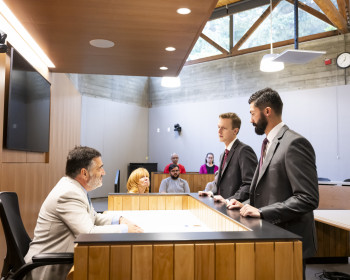Law Student Receives National Intellectual Property Writing Award
Open gallery

Stuart Leijon ’21 has been awarded the 2020 Robert C. Watson Award by the American Intellectual Property Law Association (AIPLA) for his paper on granting new intellectual property rights to individuals. The national student competition encourages interest in intellectual property issues through written articles.
“I am thrilled that the American Intellectual Property Association selected his paper for this award,” Professor Lydia Loren stated. “Stuart’s national recognition is an affirmation of his writing ability and creative ideas.”
Leijon’s paper was honored with this award because of the article’s contribution to intellectual property knowledge, its original and creative thought, and the inclusion of previously unpublished information. As the winner of this national writing competition, Leijon will attend the virtual AIPLA Spring Annual Meeting in May where he will receive recognition for the paper.
The paper, “Data, People, and Property: Modernizing Privacy Through Intellectual Property Law”, proposes that a new intellectual property right could help mitigate the issues around improper use of consumer data that companies such as Instagram and Google collect. The paper’s proposal is supported by consumer privacy legislation and intellectual property theory. “I argue that the current frameworks leave much to be desired in terms of balancing privacy protection and protecting the value that exists in collecting and analyzing personal information,” Leijon states.
“Consumer data is super cool–it has limitless applications in industry, healthcare, entertainment, automation, AI, and on and on,” Leijon states. “But it’s also dangerous because consumer data improperly used can result in discrimination, personal-life intrusions, the spread of misinformation, vulnerability, and so many other harms.”
Leijon became interested in information privacy when he worked for a legal processing company that provided data breach response services prior to law school. “I was startled by the power that information, especially misinformation, has over people,” Leijon said. “I began looking into misinformation on my personal time and found that privacy protections are a key protection against misinformation; they provide a person some power to control information that affects them.”
During his first year of law school, Leijon kept thinking about how tort, contract, and property could prevent undue information collection and use, these thoughts became the foundation for “Data, People, & Property”. Professor Loren’s Intellectual Property Survey and Professor David Silverman’s Information Privacy courses helped Leijon hone the paper topic and idea.
“Professor Loren’s course was my first brush with intellectual property theory and it just made sense: here are all these theories about how we treat important and valuable information and here is consumer data, which happens to be important and valuable information,” Leijon said. “Professor Silverman’s course taught me that privacy is a set of principles more than anything else and that I had a lot of research to do before I had any hope of understanding them. A paper for his class was the preliminary research for this paper.”
“I would like to say a huge thanks to AIPLA for their generosity and to Professor Loren and Professor Silverman for supporting my unusual ideas,” Leijon stated.
Leijon’s paper will be published in the AIPLA Journal’s Summer 2021 issue.
Law Communications is located in room 304 of Legal Research Center (LRC) on the law Campus.
MSC: 51
email jasbury@lclark.edu
voice 503-768-6605
Cell: 626-676-7923
Assistant Dean,
Communications and External Relations, Law School
Judy Asbury
Law Communications
Lewis & Clark Law School
10101 S. Terwilliger Boulevard MSC 51
Portland OR 97219

